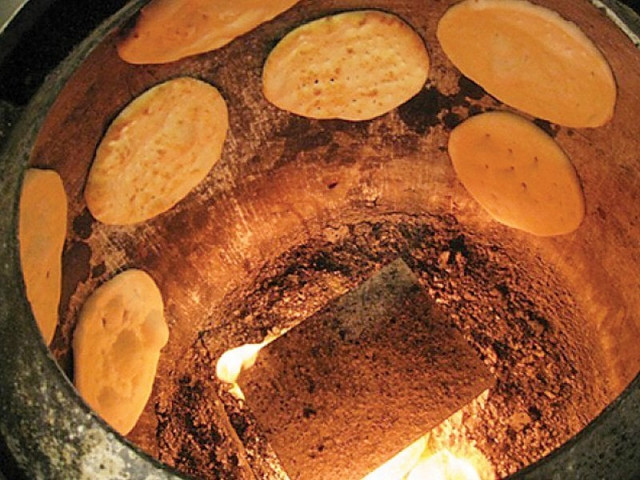Tandoor association calls off strike after successful talks with K-P govt
Under the agreement naan of 115 grammes will be sold at Rs10 and 170 grammes at Rs15

Under the agreement naan of 115 grammes will be sold at Rs10 and 170 grammes at Rs15. PHOTO: FILE
The tandoor association of K-P announced the shutter-down strike on Monday after the provincial authority had declined its request to increase prices of flatbread (naan) amid the wheat crisis across the country.
As the large number of bread ovens remained shut, residents across the province faced immense difficulties with the traditional flatbread was being sold for up to Rs60 per piece.
The tandoor association had argued that it was impossible to sell flatbread on the government-fixed prices owing to the inflated prices of wheat.
Flatbread sells for Rs60 as Naanbai strike in K-P enters second day
Under the agreement, the naan of 115 grammes would be sold at Rs10 whereas the price of naan weighing 170 grammes is set at Rs15.
The talks were held between local officials of Peshawar including the assistant commissioner Sarah Rehman and representatives of the tandoor association, the officials said.

Sources told The Express Tribune that the provincial government has launched a crackdown and arrested several leaders of the association. Raids against hoarders were also initiated but no information about it has been made public yet, sources said.
Wheat crisis
In its summary to the Economic Coordination Committee (ECC), the Ministry of National Food Security and Research stated that in order to decrease the local wheat prices and to cater to the domestic requirements, import of the commodity should be allowed.
The ministry did not mention anything about hoarding in the country. Unlike the claim by the government that media was responsible for the wheat crisis, the ECC was informed that the food authority sought permission to import wheat in October last year.
According to the ministry, the federal and provincial governments bought 2.2 million tonnes or 35.3% less wheat from the farmers “due to wheat loss and quality issues”.
Against the target of 6.25 million, all the government departments bought only 4 million tonnes of wheat, contributing to low stocks.
The ECC was informed that the country has a wheat stock of only 4.23 million tonnes, which is sufficient to meet requirements for only two months.
However, the ECC was told that as against the allocations of 1.1 million tonnes to the provinces from the federal government’s stocks, the provincial governments of Sindh, Khyber-Pakhtunkhwa and Balochistan have not lifted complete stocks, which also contributed to the crisis.
Smuggling was another factor, which continued through Afghan borders while the authorities turned a blind eye towards the illegal act.
Similarly, the ECC was informed that there was a ban on wheat and export of its products with effect from July 25, 2019. But the Pakistan Bureau of Statistics record showed that 48,000 tonnes of wheat was exported during the current fiscal year.
Since September 2018, the PTI government has exported 693,000 tonnes of wheat.



















COMMENTS
Comments are moderated and generally will be posted if they are on-topic and not abusive.
For more information, please see our Comments FAQ